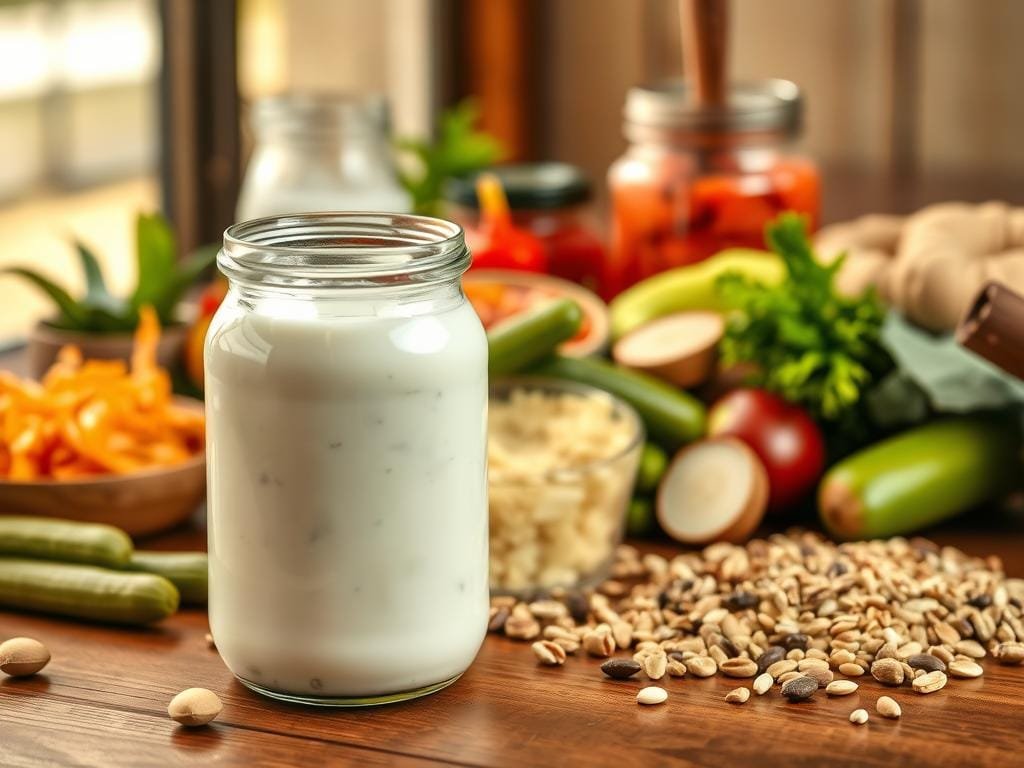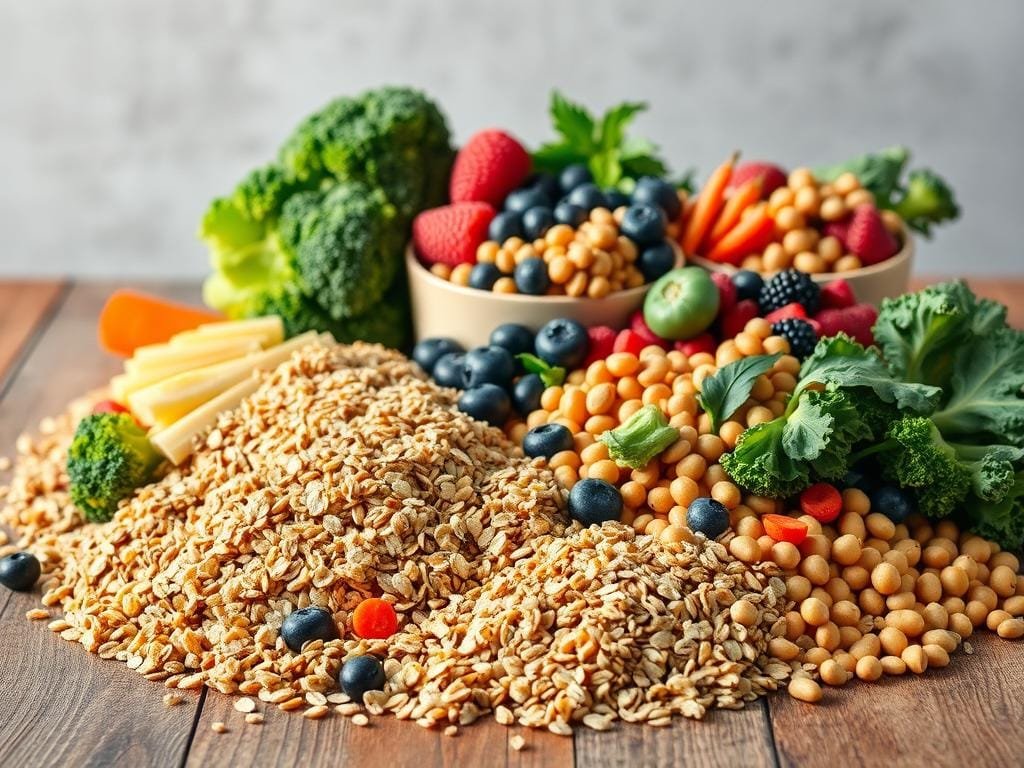Did you know that your gut microbiome produces millions of neurotransmitters that affect your mood and well-being? The complex ecosystem in your gut is key to your immune system, heart health, brain health, and sleep quality.
A healthy gut leads to a balanced life. Nourishing it with the right foods and habits can greatly improve your life quality. In this article, we’ll look at 9 natural ways to improve your gut health and boost your mood.
Understanding gut health’s importance and using these proven methods can make you healthier and happier.
Table of Contents
Understand the Importance of Gut Health
Gut health is key to feeling good overall. Your gut microbiome helps with digestion, immune function, and even your mood.
Why Gut Health Matters
A healthy gut has many types of bacteria. Studies show that a diverse gut microbiome can lower the risk of diseases like diabetes and inflammatory bowel disease. A balanced gut is vital for health, affecting digestion, mood, and immune strength.
For more information, check out the American Medical Association’s guide on improving gut health.
Link Between Gut and Mental Health
The gut and brain are connected through the gut-brain axis. This network links the gut and brain, showing why gut health affects mental health. An imbalance in gut bacteria, or dysbiosis, can lead to anxiety and depression.
Eating a fiber-rich diet, staying hydrated, and managing stress can help your gut and mental health. These habits support a healthy balance of gut bacteria.
Incorporate Probiotics Into Your Diet
Probiotics are key for a healthy gut. They can be found in many foods and supplements. Knowing where to find them can help you keep your gut healthy.
Best Sources of Probiotics
Probiotics are live, good bacteria. They are in fermented foods and supplements. Here are some of the best sources:
- Yogurt: Choose yogurt with “live and active cultures” for probiotics.
- Kefir: A fermented milk product with many probiotic bacteria.
- Kimchi: A Korean dish made from fermented vegetables, full of probiotics.
- Sauerkraut: Fermented cabbage that’s good for your gut.
- Probiotic Supplements: If food sources are hard to find, supplements are a good option.

How Probiotics Benefit Your Gut
Probiotics change your gut’s bacteria balance. This is important for digestion, immune health, and even your mind. Here are some benefits:
| Benefit | Description |
|---|---|
| Improved Digestion | Probiotics help break down food and absorb nutrients better. |
| Boosted Immunity | A healthy gut, supported by probiotics, strengthens your immune system. |
| Mental Health Support | Probiotics may help with anxiety and depression by improving gut health. |
For more on natural supplements, including probiotics, check out Boost Healthy Life.
Eat a Diverse Range of Foods
To boost your gut health, eating a variety of foods is key. A diet full of different nutrients helps keep your gut microbiome healthy. This is important for your overall well-being. Adding many foods to your meals helps keep your gut balanced.
Benefits of Dietary Diversity
Eating a wide range of foods gives your gut the nutrients and fiber it needs. A diverse diet encourages the growth of good bacteria. This is important for digestion, immune function, and even mental health. Without diversity, your gut bacteria can get out of balance, leading to health problems.
Studies show that eating many different foods makes your gut microbiome stronger. This diversity is linked to better health and lower risks of chronic diseases. For more tips on dietary diversity, check out Zoe’s guide to eating 30 plants per week.
Foods to Include for Gut Health
Adding gut-friendly foods to your diet is essential for gut health. Foods high in fiber, like legumes, whole grains, and fruits, are great. Also, include garlic, fermented foods, and collagen-rich foods.
- Legumes: beans, lentils, and peas
- Whole grains: oats, quinoa, and brown rice
- Fermented foods: yogurt, kefir, and sauerkraut
- Fruits and vegetables: berries, leafy greens, and broccoli
By eating these foods, you support a healthy gut microbiome and overall well-being.
Increase Your Fiber Intake
Fiber is key for a healthy gut. Eating more fiber can boost your health. It helps grow good bacteria in your gut, improving digestion and overall health.
Types of Fiber That Support Gut Health
There are two main types of fiber: soluble and insoluble. Soluble fiber turns into a gel in water, slowing down digestion. Foods like oats, nuts, and apples are high in soluble fiber.
Insoluble fiber doesn’t dissolve in water and helps stool move. You can find it in whole grains, broccoli, and carrots.
Here’s a list of some high-fiber foods:
| Food | Serving Size | Fiber Content (grams) |
|---|---|---|
| Oats | 1 cup cooked | 4 |
| Broccoli | 1 cup cooked | 5 |
| Apple | 1 medium | 4 |
| Almonds | 1 ounce | 3.5 |
How to Boost Your Fiber Consumption
To eat more fiber, start with small changes. Add fruits, veggies, and whole grains to your meals. Try oatmeal with fruits and nuts for breakfast. You can also find more ways to digest better naturally.
Here are some tips:
- Slowly add more fiber to your diet to help your gut adjust.
- Drink lots of water to help fiber move through your body.
- Eat a variety of fiber-rich foods to get both types of fiber.

Stay Hydrated
Drinking enough water is key for a healthy gut and digestion. It helps grow a diverse range of gut bacteria. This is vital for a well-functioning digestive system.
The Role of Water in Digestion
Water helps break down nutrients and fiber, making them easier for the body to use. It also keeps stool soft, helping to avoid constipation and ensuring regular bowel movements.
Key benefits of water in digestion include:
- Breaking down nutrients for better absorption
- Preventing constipation by softening stool
- Promoting regular bowel movements
Tips for Staying Hydrated
It’s good to drink at least eight glasses of water a day. But, your needs might change based on your climate, how active you are, and your health.
Here are some tips to help you stay hydrated:
- Drink a glass of water as soon as you wake up
- Carry a water bottle with you throughout the day
- Incorporate hydrating foods like watermelon and cucumbers into your diet

Manage Stress Levels
Chronic stress can harm your gut health, making it key to manage stress. Stress triggers your body’s “fight or flight” response, releasing hormones like cortisol. High cortisol levels can upset your gut microbiome, causing digestive problems and other health issues.
The Gut-Brain Connection
The gut and brain are linked through the gut-brain axis. This network lets the gut and brain talk to each other, affecting both gut health and mental well-being. Studies show stress can change your gut microbiome, reducing good bacteria and increasing bad ones (Source).
Techniques to Reduce Stress
There are many ways to manage stress and keep your gut healthy. Here are a few:
- Meditation: Regular meditation can lower cortisol levels and help you relax.
- Physical Activity: Activities like walking or yoga can reduce stress and improve gut movement.
- Massage Therapy: Massage can lower stress by releasing endorphins.
- Social Connection: Spending time with loved ones can reduce stress and boost well-being.
- Yoga: Yoga combines movement, deep breathing, and meditation to reduce stress and improve gut health.
By adding these stress-reducing activities to your daily life, you can manage stress and keep your gut microbiome balanced.
Get Enough Sleep
The quality of your sleep affects your gut health. Poor sleep can lead to inflammation and changes in gut bacteria. This can harm your overall health.
Impact of Sleep on Gut Health
Sleep helps balance your gut microbiome. It regulates your immune system. Without enough sleep, this balance can be disrupted, causing gut issues.
Poor sleep can make your gut more permeable. This lets toxins pass through more easily. This can cause problems like irritable bowel syndrome (IBS) and other gut disorders.
Getting enough sleep is key to a healthy gut.
Sleep Hygiene Tips for Better Rest
Improving your sleep hygiene can make your sleep better. Here are some tips for better rest:
- Stick to a consistent sleep schedule, sleeping and waking at the same time every day.
- Make your bedroom dark, quiet, and cool for a restful sleep environment.
- Stay away from caffeine and electronic devices before bed, as they can make it hard to fall asleep.
- Do relaxing activities before bed, like reading or a warm bath, to signal it’s time to sleep.
By following these sleep hygiene tips, you can improve your sleep quality. This supports your gut health. Prioritizing sleep is vital for overall well-being.
Limit Artificial Sweeteners
Want to improve your gut health? Start by cutting down on artificial sweeteners. Too much of these can upset the balance of good and bad bacteria in your gut.
Effects of Sweeteners on Gut Microbiome
Studies show artificial sweeteners can change your gut’s bacteria. This might lead to health problems. Some issues include:
- Reduced diversity of gut bacteria
- Impaired glucose tolerance
- Increased susceptibility to metabolic disorders
Common artificial sweeteners to limit or avoid include: aspartame, saccharin, and sucralose. You’ll find them in diet sodas, sugar-free gum, and low-calorie desserts.
Healthier Alternatives to Consider
Instead of artificial sweeteners, try natural ones. They’re gentler on your gut. Here are some good options:
- Honey: It’s full of antioxidants and has antibacterial properties.
- Maple syrup: It has minerals like manganese and zinc.
- Stevia: Made from Stevia rebaudiana, it’s calorie-free and doesn’t affect blood sugar.
Using these natural sweeteners lets you enjoy sweetness without harming your gut. Just remember, too much of anything is bad, even natural sweeteners.
Avoid Overuse of Antibiotics
Using antibiotics wisely is key to a healthy gut. Too much use can upset the balance of good bacteria in your gut. This can lead to health problems.
Impact on Gut Bacteria
Antibiotics fight bad bacteria but can harm good bacteria too. This imbalance can hurt your health. You might need supplements to fix it.
Responsible Use of Antibiotics
Only take antibiotics when a doctor says so. This helps keep your gut healthy. A balanced gut means a stronger immune system and better mental health.
